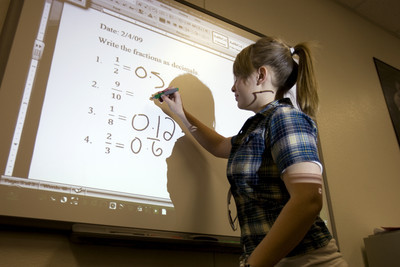Students tally improved math test scores
The poster of a grimacing Muhammad Ali stares down at the students in Jeff Bagford's pre-algebra class at Harney Middle School. "Nothing is impossible" is the poster's message, spelled out in big block letters.
Bagford tells his eighth-graders that like the boxer, they are knocking out math equations.
"You did your first combination. I didn't even have to show you how to do it," he said.
But what's a combination? It's an equation "in which the order of objects is not important," Bagford said.
Ironically, sequencing, as in the order and timing of lessons, was one reason middle and high school students showed improvement in their end-of-semester math exams.
Students did better than last year, when high failure rates embarrassed the district, but overall passing rates still remained low.
"We are digging ourselves out of a hole, but we are making progress," Clark County School District Superintendent Walt Rulffes said when the test results were reported at Wednesday's special School Board meeting.
High school students taking the January tests improved by 29 percentage points in geometry but still had an overall passing rate of 41 percent. Algebra and Algebra II results increased by about 7 to 8 percentage points to an overall passing rate of 16 percent and 22 percent respectively.
Middle school pre-algebra test takers improved by 15 percentage points to a passing rate of 36 percent.
Rulffes said the failure rate is inflated because over half the students in the failing column actually earned a D, which is normally considered a passing grade.
The districtwide test, known as the common math assessment, requires a C for passing since the district's goal is to increase the number of students earning C's or better. Rulffes wants an 80 percent passing rate by 2011.
But the math assessment test is not a high-stakes test needed for high school graduation or college acceptance. The staff-created test is considered a measure of how schools are faring in mathematics. Because all students in pre-algebra, algebra I and II and geometry take the same tests, administrators can better pinpoint trouble areas.
Keller Middle School, for instance, was one of a handful of middle schools that didn't show progress in pre-algebra. The failure rate increased from 92.6 percent last year to 96.8 percent this year.
Keller Principal April Key wouldn't comment until she reviews the results with staff. But even schools with cause for celebration are taking a "We can do better" attitude.
Harney increased its pass rate in pre-algebra from 8 percent to 21.4 percent even as the number of eighth-graders taking the test increased by 142 students.
"That's a double win," said Jhone Ebert, assistant superintendent for instruction.
Harney Principal Susan Echols, however, said she is not satisfied with the relatively lowing passing rate.
"Notice we had 78 percent who did not pass," Echols said.
To improve scores, the district is closely monitoring the sequence of instruction and making sure teachers stay on the curriculum.
"The day of the Julie Andrews school is over," Echols said, alluding to the main character in "The Sound of Music." "We no longer teach 'These are a few of our favorite things.' "
Instructors also made sure students and parents got practice exams whose questions mirrored the real test. Only the questions' terms or numbers were different.
Under repeated questioning from School Board members Wednesday, district officials denied they had "dumbed down the test" but stressed that the actual rigor had increased.
The officials also praised the state's Regional Professional Development Program for giving assistance to substitute math teachers. It's one of the programs slated to be cut under Gov. Jim Gibbons' recommended budget.
If passing rates are not as high as school officials would like, Deanna Wright, a new School Board member, noted that misery loves comfort.
"As parents, we feel like our kids are the only ones not getting it," she said at the board meeting. "Then you talk to other parents; their kids are not getting it either."
Contact reporter James Haug at jhaug@reviewjournal.com or 702-374-7917.
MATH SCORES Testing gainsPowerPoint presentation summarizes the gains seen in both middle school and high school testing. (Some characters may not display correctly on your computer, because fonts are not embedded in this document.) Algebra test scoresMiddle school first semester test scores for algebra and pre-algebra, by school. High school test scoresHigh school first semester test scores for algebra I, algebra II and geometry, by school. SummariesSummaries of goals for the school district's mathematical assessments, as well as a brief summary of this year's results. Summaries Summaries of goals for the school district's mathematical assessments, as well as summarizing the results, broken down by course content.



















